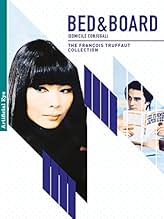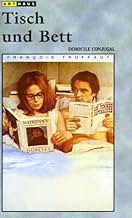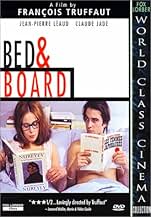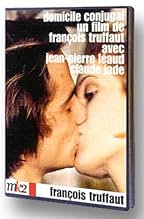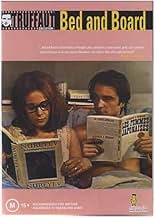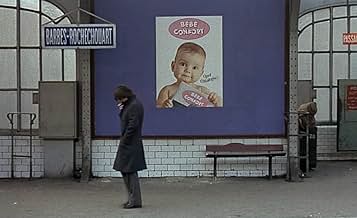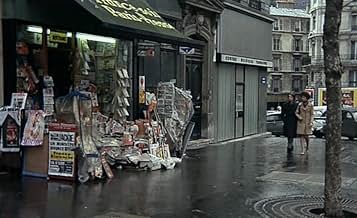Domicile conjugal
- 1970
- Tous publics
- 1h 37min
Antoine Doinel teint les fleurs mourantes de la cour devant son appartement. Il est marié à Christine qui est enceinte. Il a une liaison avec une femme japonaise, mettant en péril son mariag... Tout lireAntoine Doinel teint les fleurs mourantes de la cour devant son appartement. Il est marié à Christine qui est enceinte. Il a une liaison avec une femme japonaise, mettant en péril son mariage.Antoine Doinel teint les fleurs mourantes de la cour devant son appartement. Il est marié à Christine qui est enceinte. Il a une liaison avec une femme japonaise, mettant en péril son mariage.
- Réalisation
- Scénario
- Casting principal
- Récompenses
- 1 victoire au total
- Kyoko
- (as Mademoiselle Hiroko)
- La mère de Marianne
- (as Annick Asty)
Avis à la une
I think Bed and Board is most fascinating and involving because it is another part of the complicated saga of Doinel's life. You need that context for it to work so well, and on its own I wonder if it may have been more off putting or simply confusing when very late in the film, once Doinel has been found out by Christine that he's been cheating with a (can't believe I'm typing these words) less interesting Yoko Ono kind if character and has been in this affair for some time and it seems like his marriage may be on the rocks, he calls up Christine multiple times while at dinner with his would-be side squeeze to complain about how miserable he is and... it's almost like he needs permission for it to all be over, that he's OK and that it'll all work out.
Ill leave it to you to watch it to find that out. But suffice it to say this is on its own terms at times sort of equal parts mundane and entertaining in a completely off-beat and off-kilter way, such as the various interlopers and neighbors in the apartment complex where Antoine and Christine (a very engaging and excellent and can hold her own with Leaud level performer in Claude Jade) live together, and as well equal parts amusing and heartbreaking.
I mean, this is a movie where at one point Antoine breaks through a wall with an axe or sledgehammer like a more jokey Jack Torrance, and at another when Christine confronts Antoine with his infidelity (she finds it out because the Japanese lady has been leaving messages in roses which in a string of events I won't get into end up in the apartment and she sees them) by uh dressing up in Japanese garb and make up and wtf I laughed but I'm not sure why. Oh, and Jacques Tati makes a cameo as M Hulot getting on a train because Truffaut is I guess making a Hulot movie only Doinel is like far from that(?)
I love a good marriage drama or story on infidelity, and this absolutely has that if nothing else because this couple with Leaud and Jade are wonderful together, as they convey how each really in their own way is trying to make this marriage work, whether it's in those little moments in bed when it's time to turn off the lights (a particular tender moment involving her glasses is something that feels lived in like if Truffaut or his writers didn't take it from a real moment then the actors did), or when they do have their blow-out fights (that poor mattress).
Again, it's fascinating that this is the follow-up so soon after Stolen Kisses as it has sometimes the same light tone but other times manages to probe into the existential maybe-trauma exploration of 400 Blows, and eventually in the film it becomes clearer that the little things with Doinel, how he acts or reacts or closes up or looks at another person, is all about what HE is looking for or needs, while Christine has to just take it.
In other words, this is a good movie, at times really good, but it is contigent on if you've seen the other parts of what these people have gone through. As a tale of marriage it is both sweet and unfortunate, like biting into a bar of rich milk chocolate that has a sour patch kids middle, and one where Truffaut (because after all this is his and to an extent Leaud's alter ego) is self criticizing himself and men like them. And the filmmaker's idiosyncrasies make it linger and pop more than what you'd get with anyone else, though I can't help but feel the parts are greater than the whole here. Oh well, on to the last part!
"Stolen Kisses," the preceding movie, was a romantic comedy with such a consistently sweet and charming tone that it became something more than mere fluff. "Bed and Board" maintains the same sparkling tone for about the first hour. Christine and Antoine's apartment building is inhabited by the quirkiest group of Parisians to come along until "Amélie," thirty years later. (Both movies even have an old man who refuses to leave his apartment.) Indeed, the movie, and its hero Antoine, are in love with quirkiness: Antoine works dyeing flowers and operating remote-controlled model boats, which are even stranger than the odd jobs he held in "Stolen Kisses." There are also some tenderly idiosyncratic scenes between the newlyweds.
But "Bed and Board" becomes much less interesting when it aims for a more serious tone and introduces infidelity into the plot: Antoine cheats on Christine with a Japanese woman, Kyoko. To add insult to injury, Kyoko is a blatant stereotype of the "exotic, submissive Asian woman," wearing kimono and writing calligraphy. Maybe Christine and Antoine were always a mismatched coupleChristine is very practical and bourgeois, while Antoine is a fanciful dreamerbut if he has to cheat on her, couldn't he do it with someone amusing?
Obviously the Antoine Doinel series dealt with some very serious themes in its first installment, "The 400 Blows." But that movie was a unique, distinctive look inside the head of a troubled 14-year-old boy; however, the serious themes of "Bed and Board" are found in innumerable French movies about infidelity. It's too bad that "Bed and Board" falls so flat in its second half, because its first half is whimsical comedy at its best.
François Truffaut tells a story of ordinary betrayal, in which a perfect marriage is challenged by the narcissistic attitude of a man, too sure of the love of his wife, a sacrificial victim on the altar of his own selfishness. Claude Jade's interpretation, who embodies the loving wife, is praiseworthy, but Jean-Pierre Léaud also outlines well the evolution of his character, now in its fourth chapter. A beautiful and enjoyable film, even if the theme of betrayal, and in particular of forgiveness, in my opinion is treated with excessive superficiality.
Le saviez-vous
- AnecdotesWhen Claude Véga appears, he impersonates Delphine Seyrig and quotes a line from L'année dernière à Marienbad (1961). He also quotes from a line that Seyrig spoke in the previous Antoine Doinel film, Baisers volés (1968).
- Citations
[English subtitled version]
Christine Doinel: I don't like this business of writing about your childhood, dragging your parents through the mud. I don't know much, but one thing I do know - if you use art to settle accounts, it's no longer art.
- ConnexionsFeatured in L'amour en fuite (1979)
Meilleurs choix
- How long is Bed & Board?Alimenté par Alexa
Détails
- Date de sortie
- Pays d’origine
- Site officiel
- Langues
- Aussi connu sous le nom de
- Domicilio conyugal
- Lieux de tournage
- Sociétés de production
- Voir plus de crédits d'entreprise sur IMDbPro
Box-office
- Montant brut aux États-Unis et au Canada
- 509 $US
- Week-end de sortie aux États-Unis et au Canada
- 11 206 $US
- 25 avr. 1999
- Montant brut mondial
- 509 $US
- Durée1 heure 37 minutes
- Rapport de forme
- 1.66 : 1
Contribuer à cette page


![Regarder Bande-annonce [OV]](https://m.media-amazon.com/images/M/MV5BMjUxOWI3YmItYTRmOC00ODFkLWEwYjQtZDc0OWFkMjk1ZmU4XkEyXkFqcGdeQXRyYW5zY29kZS13b3JrZmxvdw@@._V1_QL75_UX500_CR0)
